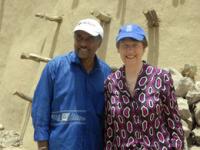
Feature Story
First joint mission by UNDP and UNAIDS to Mali
01 May 2010
01 May 2010 01 May 2010
UNAIDS Executive Director Michel Sidibé and Administrator of the United Nations Development Programme (UNDP) Helen Clark during their joint mission to Mali. 01 May 2010. Credit: UNAIDS
The Administrator of the United Nations Development Programme (UNDP) Helen Clark and Executive Director of UNAIDS Michel Sidibé are on a four day mission to Mali. It is the first joint mission to Mali by these two UN agencies. Ms Clark, who is also Chair of the United Nations Development Group and Chair of the UNAIDS Committee of Cosponsoring Organizations (CCO) will call for an accelerated national AIDS response in the lead-up to 2015, the target date set by the international community for reaching the Millennium Development Goals.
The official visit will include a visit to a hospital in Timbuktu, where Ms Clark and Mr Sidibé will meet health care providers, civil society, people living with HIV and other stakeholders involved in the HIV response.
They are also scheduled to meet a number of high-level government officials, including Prime Minister Modibo Sidibé and President Amadou Toumani Touré.
Mr Sidibé will reiterate his call for preventing HIV transmission from mothers to children. Only 12% of pregnant women in Mali received an HIV test in 2008 and, that same year, 18% of infants born to HIV-positive women were given antiretrovirals to prevent HIV infection.
Earlier this year the Global Fund awarded a grant of US$ 43 million to Mail towards reaching universal access to HIV prevention, treatment, care and support.
In recent years, Mali has made considerable progress in expanding HIV prevention, treatment care and support for those in need. According to government estimates Mali’s HIV prevalence has declined from 1.7% in 2001 to 1.3 % in 2006 and in 2009 80% of people who need treatment (over 27,000) were on antiretroviral treatment. UNAIDS estimates that 100 000 people are currently living with HIV in Mali.



